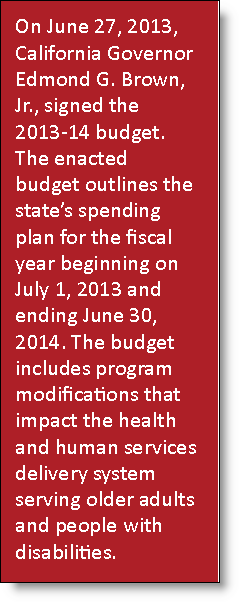Implications for Older Adults and People with Disabilities
Background and Updated Budget Picture
The final budget outlines fiscal year 2013-14 expenditures of approximately $96.3 billion, revenues of $98 billion, and a $1 billion reserve. Despite there being no new reductions to health and human services programs, the budget neglects to restore many of the previously-implemented reductions to programs serving older adults and people with disabilities.
Items Impacting Older Adults and People with Disabilities
The following budget items impact older adults and people with disabilities, as well as the broader long-term services and supports (LTSS) service delivery system.
Revisions to the Coordinated Care Initiative 
Background: Last year’s state budget established the Coordinated Care Initiative (CCI) with the goal of “transforming California’s Medi-Cal delivery system to better serve the state’s low-income older adults and persons with disabilities”. The CCI outlines changes to the medical care and LTSS systems serving these individuals and specifies various requirements related to the Dual Eligible Integration Demonstration (renamed “Cal MediConnect”).The main components of the CCI include: 1) provisions of Cal MediConnect; 2) mandatory enrollment of dual eligible individuals (individuals eligible for both Medicare and Medi- Cal) into Medi-Cal managed care,* and 3) integration of Medi-Cal-funded LTSS into Medi-Cal managed care.The CCI is slated for implementation in eight counties (Alameda, Los Angeles, Orange, Riverside, San Bernardino, San Diego, San Mateo, and Santa Clara). California received federal approval for Cal MediConnect on March 27, 2013.
Enacting Legislation, “CCI Trailer Bill”
The Budget “Trailer Bills” outline the statutory authority through which to implement components of the budget. For the CCI, the Trailer Bill Language (TBL) includes significant policy elements that impact the program and its implementation, as follows:10
De-Linking of CCI Components: The TBL “de-links” the three components of the CCI, which are: 1) establishment of Cal MediConnect; 2) mandatory enrollment of dual eligibles into Medi-Cal managed care; and 3) implementation of Medi-Cal managed LTSS. This separation in statute permits the three components of the CCI to proceed independently.
“Poison Pill” Provision:
• Initial Determination:The TBL permits the Department of Finance (DOF) to determine, at least 30 days prior to enrolling beneficiaries in the CCI, whether the overall CCI program will lead to net General Fund (GF) savings. Should DOF determine that the CCI will not generate net GF savings, all components of the CCI will be suspended immediately and the CCI shall become inoperative July 1, 2014.
• Annual Determination:Assuming the CCI is implemented, the DOF will estimate by January 10th of each year after implementation the amount of net GF savings associated with the CCI. If the DOF determines that the CCI will not generate net GF savings, the CCI will become inoperative January 1 of the following calendar year.
• If the CCI beomes inoperative:If the CCI becomes inoperative, then Department of Health Care Services (DHCS) will be responsible for providing notifications to affected parties.